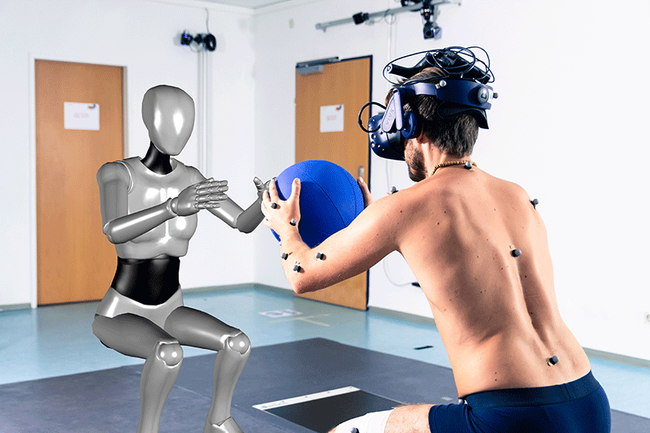VR Games as Training for Sentient Leg Prosthesis
Interdisciplinary Research Project for the Development of Immersive Virtual Reality Exergames
Saphenus medical technology GmbH has brought the world‘s first sentient leg prosthesis onto the market. It features a system that allows amputees to regain the feeling in the soles of their lost feet.
The sentient leg prosthesis consists of a sensor sock for the foot part of the prosthesis and an actuator which is directly integrated into the leg shaft. The sensor sock measures forces occurring during walking and transmits them to the actuator in the shaft in real time. The wearer of the prosthesis feels these forces through the skin touching the shaft, thus receiving feedback about when the prosthesis touches the ground and when it does not.
Development of Immersive VR Exergames
In order to enable patients to make rapid progress in rehabilitation following an amputation and to learn quickly how to correctly deal with the prosthesis and the additional information of the feedback system, the company Saphenus has commissioned an interdisciplinary team of the St. Pölten University of Applied Sciences to conduct research on its behalf.
The objective is to combine Virtual Reality and motion capturing to develop Virtual Reality Exergames. Exergames (a newly created word made up of “exercise” and “games”) are computer games that invite the player to move, while “immersive” refers to a virtual environment that the user can directly interact with, which makes the entire experience very realistic.
AVATAR
The idea of the project AVATAR (Augmented and Virtual Reality to Support Prosthetic Rehabilitation) is to create highly motivating training scenarios using VR that provide real-time feedback about the movement behaviour to the therapist and the patient using VR and motion capturing technologies, and thus support and expand traditional therapeutic methods with innovative approaches.
Interdisciplinary Research Team
The AVATAR project features staff members of the Institute of Health Sciences and the Institute of Creative\Media/Technologies working together. The ReMoCapLab, the lab for gait and movement analysis at the St. Pölten UAS, forms the basis of the project.
The project lead is shared by FH-Prof. and Senior Researcher Brian Horsak and Junior Researcher Mark Simonlehner, both of whom are active at the Institute of Health Sciences.
![]()
Copyright: Brian Horsak, FH St. Pölten
